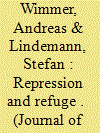| Srl | Item |
| 1 |
ID:
108117


|
|
|
|
|
| Publication |
2011.
|
| Summary/Abstract |
This article seeks to contribute to recent debates on the link between political settlements and state building. It proposes a theoretical framework that centres on the alternative concept of 'elite bargain' and suggests that inclusive elite bargains can be expected to facilitate both peace and economic development. Yet a detailed case study of elite bargains in Zambia shows that all good things do not always go together. While inclusive elite bargains have indeed helped to avoid civil war, they have often constrained economic development-a dilemma of unproductive peace.
|
|
|
|
|
|
|
|
|
|
|
|
|
|
|
|
| 2 |
ID:
106031


|
|
|
|
|
| Publication |
2011.
|
| Summary/Abstract |
Though peace and a new inclusive form of politics were promised, Museveni's Uganda has been plagued by a series of civil wars. This article explains the continuation of and propensity towards conflict by focusing on the country's 'elite bargain', defined as the distribution of positions of state power between contending social groups. Analysing Uganda's elite bargain in terms of political, economic, military, and territorial power sharing, the article argues that it has been only partially inclusive. Political, military, and economic power have remained ethnically biased in favour of groups from western and central Uganda, and this in turn has been a major driver of recurrent civil wars. Increased territorial power sharing since the late 1990s helps explain the recent decline in violent conflict, and may also help prevent new civil wars.
|
|
|
|
|
|
|
|
|
|
|
|
|
|
|
|
| 3 |
ID:
159746


|
|
|
|
|
| Summary/Abstract |
This article asks why ethnic exclusion from executive-level state power leads to armed conflict in some cases but not in others. To resolve this puzzle, it focuses on the possible role of five additional, qualitatively coded factors that have been considered by either grievance or opportunity theories of civil war but for which quantitative data are not readily available. To assess the combined relevance of these factors, the authors use qualitative comparative analysis (QCA) to explore the diverging conflict trajectories of 58 ‘most similar’ ethnic groups. These groups have a uniformly high conflict propensity because they are politically excluded, situated in poor countries, live geographically concentrated, and comprise substantial parts of the population; yet, only 25 of them actually experienced violent conflict. The results show that the resentment created by ethno-political exclusion translates into violent conflict if the state reacts against initial protests and mobilization with indiscriminate violence, and if there is a refuge area either within or outside the country that allows regime opponents to organize armed resistance. Moreover, a more processual analysis of conflict dynamics reveals that the conditions conducive to ethnic rebellion appear in a particular temporal sequence with a clear and universal escalation pattern.
|
|
|
|
|
|
|
|
|
|
|
|
|
|
|
|